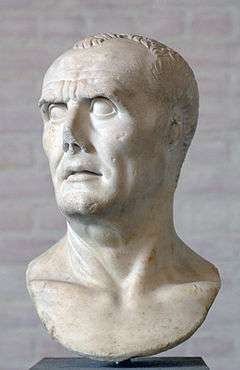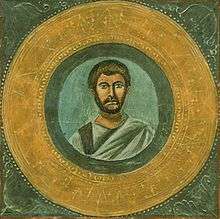2nd century BC
The 2nd century BC started the first day of 200 BC and ended the last day of 101 BC. It is considered part of the Classical era, although depending on the region being studied, other terms may be more suitable. It also considered to be the end of the Axial Age.[1] In the context of the Eastern Mediterranean, it is referred to as the Hellenistic period.
| Millennium: | 1st millennium BC |
|---|---|
| Centuries: | |
| Timelines: | |
| State leaders: | |
| Decades: | |
| Categories: | Births – Deaths Establishments – Disestablishments |
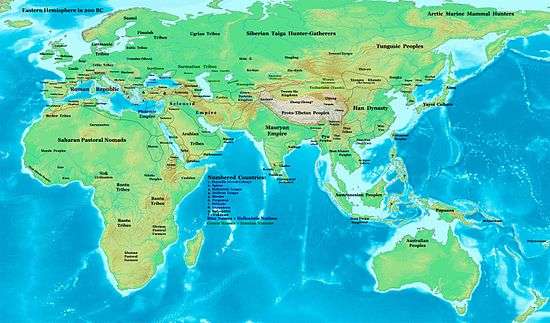
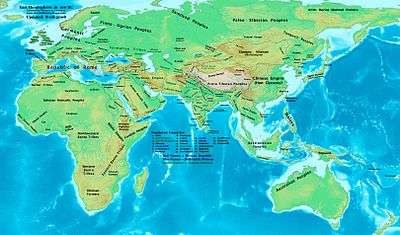
Fresh from its victories in the Second Punic War, the Roman Republic continued its expansion into neighboring territories, eventually annexing Greece and the North African coast, after destroying the city of Carthage at the end of the Third Punic War. Rome's influence was also felt in the Near East, as crumbling Hellenistic states like the Seleucid Empire were forced to make treaties on Roman terms to avoid confrontation with the new masters of the western Mediterranean. The end of the century witnessed the reform of the Roman Army from a citizen army into a voluntary professional force, under the guidance of the noted general and statesman Gaius Marius (Marian Reforms).
In South Asia, the Mauryan Empire in India collapsed when Brihadnatha, the last emperor, was killed by Pushyamitra Shunga, a Mauryan general and the founder of the Shunga Empire.
In East Asia, China reached a high point under the Han Dynasty. The Han Empire extended its boundaries from Korea in the east to Vietnam in the South to the borders of modern-day Kazakhstan in the west. Also in the 2nd century BC, the Han dispatched the explorer Zhang Qian to explore the lands to the west and to form an alliance with the Yuezhi people in order to combat the nomadic tribe of the Xiongnu.[2]
Events

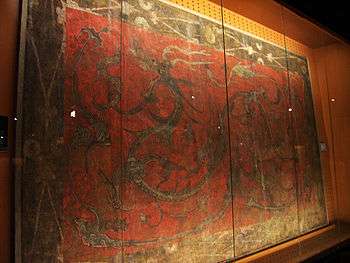
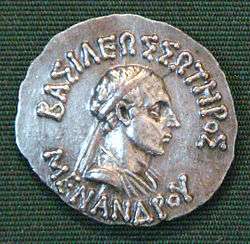


190s BC
- 198 BC: Battle of Panium: Antiochus III of the Seleucid empire defeats Ptolemy V of Egypt and takes control of Coele Syria and Judea.
- 197 BC: Flamininus defeats Philip V of Macedon at the Battle of Cynoscephalae.
- 196 BC: Antiochus III conquers western Asia Minor and Thrace, with severe impact on relations with Rome.
- 196 BC: Empress Lü's execution of Han Xin leads to the Ying Bu rebellion.
- 195 BC: The War against Nabis marks the end of Spartan power in Greece.
- 195 BC: Emperor Gaozu of Han dies and is succeeded by his son Hui. True power falls to Empress Lü.
- 194 BC: Wiman establishes Wiman Joseon in Korea.
- 192 BC: Antiochus III invades Greece, beginning the Roman-Syrian War.
- 192 BC: The Yue Kingdom of Eastern Ou established in Zhejiang with Chinese support.
- 191 BC: Battle of Thermopylae: Glabrio drives Antiochus III out of Greece.
- 190 BC: Battle of Magnesia: Rome and Pergamon drive Antiochus III out of Asia Minor.
180s BC
- 189 BC: Galatian War: Vulso and Pergamon defeat Galatia.
- 188 BC: Emperor Hui of Han dies. Empress Lü remains in absolute power.
- 185 BC: Ptolemy V defeats Ankhmakis and regains control of Upper Egypt.
- c.185 BC: Pushyamitra Shunga assassinates the last Maurya emperor, founding the Shunga dynasty.
- 183 BC: Zhao Tuo of Nanyue declares himself Emperor and attacks China.
- 180 BC: Lü Clan Disturbance: with the death of Empress Lü, Emperor Wen of Han is placed on the throne.
- c.180 BC: Demetrius I of Bactria invades India, leading to the establishment of the Indo-Greek Kingdom.
170s BC
- 179 BC: Tiberius Gracchus ends the First Celtiberian War.
- 179 BC: Zhao Tuo of Nanyue makes peace with China.
- 176 BC: The Yuezhi attack the Xiongnu.
- 175 BC: Antiochus IV Epiphanes, took possession of the Syrian throne, at the murder of his brother Seleucus IV Philopator, which rightly belonged to his nephew Demetrius I Soter.
- 174 BC: The Xiongnu defeat the Yuezhi, who emigrate to Ili valley.
160s BC
- 168 BC: Roman victory in the Battle of Pydna leads to the dissolution of the Antigonid Kingdom of Macedon.
- 168 BC: Antiochus IV of the Seleucid empire invades Egypt, but is forced to turn back by Gaius Popillius Laenas.
- 167 BC: Mithradates I of Parthia takes Margiana and Aria from the Greco-Bactrian Kingdom.
- 164 BC, 25 Kislev: Judas Maccabaeus, son of Mattathias of the Hasmonean family, restores the Temple in Jerusalem (Hanukkah, Maccabean Revolt).
- 164 BC: Ptolemy VIII drives Ptolemy VI out of Alexandria. He flees to Rome.
- 164 BC: Antiochus IV dies on campaign, leaving the Seleucid empire to a nine-year-old child.
- 163 BC: Ptolemy VI regains Alexandria. Ptolemy VIII takes Cyrenaica.
- 163 BC: The rebel Timarchus seizes Media and Babylonia.
- 163 BC: On May 20, Chinese mathematicians observed and recorded the passage of the Halley's Comet.
- 161 BC: Battle of Vijithapura: Dutthagamani defeats the Tamil King Ellalan.
- 161 BC: Demetrius I Soter seizes the Seleucid throne, beginning a succession war that would consume the Seleucid realm for almost a century.
- 160 BC: The Wusun drive the Yuezhi out of the Ili valley.
150s BC
- 158 BC: The Xiongnu attack northern China.
- 157 BC: Emperor Wen of Han dies and is succeeded by his son Jing.
- 155 BC: The Lusitanians begin the Lusitanian War against Rome.
- 154 BC: The Celtiberians of Numantia begin the Numantine War against Rome.
- 154 BC: Liu Pi leads the Rebellion of the Seven States against Emperor Jing of Han China and is defeated.
- 152 BC: Alexander Balas starts a revolt against Demetrius I Soter with the support of Jonathan Maccabaeus
140s BC
- 148 BC: Mithradates I of Parthia takes Ecbatana from the Seleucids.
- 148 BC: Rome conquers Macedonia (Fourth Macedonian War).
- 147 BC: Hasmonean victories restore autonomy to Judea.
- 146 BC: Rome destroys and razes the city of Carthage (Third Punic War) and destroys the Achaean League and razes Corinth (Achaean War).
- 145 BC: Battle of Antioch: Alexander Balas of the Seleucid empire loses his throne and Ptolemy VI of Egypt loses his life.
- 145 BC: Ptolemy VIII takes control of Alexandria.
- c. 145 BC: Ai-Khanoum is sacked (possibly by the Yuezhi).
- 141 BC: Emperor Jing of Han dies and is succeeded by his son Wu whose attempts at reform are immediately stymied by his grandmother.
130s BC
- 139 BC: The assassination of Viriathus marks the end of the Lusitanian War.
- 139 BC: Mithradates I of Parthia defeats the Seleucid king Demetrius II Nicator and captures Babylonia.
- 138 BC: Minyue's invasion of Eastern Ou sparks off the Han campaigns against Minyue
- 135 BC: Minyue's invasion of Nanyue leads to conquest of its western half by China. The eastern half survives as Dongyue.
- 135 BC: Eunus begins the First Servile War.
- 133 BC: Attalus III of Pergamon dies, bequeathing his kingdom to the Roman Republic.
- 133 BC: Emperor Wu sets an ambush for the Xiongnu, beginning the Han–Xiongnu War
- 133 BC: Assassination of Tiberius Gracchus.
- 133 BC: Scipio Aemilianus wins the Siege of Numantia and conquers the Celtiberians.
- 132 BC: Rioting on the streets of Alexandria leads to civil war between Ptolemy VIII and Cleopatra II.
- 130 BC: Greek astronomer Hipparchus continues lifelong studies, becoming the first to calculate the precession of moon and sun and to create a sizable catalog of stars.
120s BC
- 129 BC: Battle of Ecbatana: Antiochus VII Sidetes of the Seleucid empire attempt to reclaim the Iranian Plateau from Parthia ends in failure.
- 127 BC: Hyspaosines of Characene takes control of Babylonia.
- 126 BC: Ptolemy VIII regains control of Alexandria.
- 125 BC: Zhang Qian returns to China after a protracted journey through the west.
- 124 BC: Artabanus II of Parthia is killed in battle with the Yuezhi and succeeded by his son Mithridates II
- 122 BC: Mithradates II of Parthia regains control of Babylonia and Characene
- 121 BC: Assassination of Gaius Gracchus
110s BC
- 113 BC: The Cimbri and Teutones arrive on the banks of the Danube in Noricum, clashing with Roman allies, beginning the Cimbrian War.
- 112 BC: Jugurtha of Numidia's elimination of his co-regents sparks the Jugurthine War with Rome.
- 111 BC: A power struggle in Nam Viet leads to its conquest by China, ending the Triệu dynasty and beginning the First Chinese domination of Vietnam.
100s BC
- 109 BC: China conquers Dian.
- 109 BC: King Ugeo of Gojoseon kills a Chinese envoy, sparking the Gojoseon–Han War.
- 108 BC: Chinese troops destroy Wanggeom seong, capital of Wiman Joseon, establishing the Four Commanderies of Han to govern the northern part of Korea.
- 107 BC: Roman consul Gaius Marius passes the Marian Reforms, which remove all ownership restrictions for joining the Roman Army.
- 106 BC: Gaius Marius and Sulla bring an end to the Jugurthine War.
- 105 BC: Battle of Arausio: Cimbri and Teutones annihilate a Roman army.
- 104 – 101 BC: War of the Heavenly Horses, China defeats Dayuan at great cost.
- 104 BC: A mass-manumission leads to the Second Servile War in Sicily
- 102 BC: Gaius Marius defeats the Teutones at the Battle of Aquae Sextiae
- 101 BC: Gaius Marius defeats the Cimbri at the Battle of Vercellae, ending the Cimbrian War.
Significant people

- Andriscus, last independent ruler of Macedon
- Antiochus IV Epiphanes, the last effective ruler of the Seleucid Empire
- Antiochus VII Sidetes, last King of a United Seleucid Empire
- Appius Claudius Pulcher, Roman consul and censor
- Boiorix, king of the Cimbri
- Cato the Elder, Roman politician, writer and historian
- Gaius Gracchus, Roman politician
- Gaius Marius, Roman general and politician
- Huo Qubing, Chinese general
- Jonathan Maccabaeus, leader of the Hasmonean rebellion and first autonomous ruler of Judea
- Judas Maccabeus, leader of the Hasmonean rebellion and its first successful general
- Li Guang, Chinese general
- Lucius Aemilius Paullus Macedonicus, Roman general and politician
- Lucius Caecilius Metellus Calvus, Roman general
- Lucius Caecilius Metellus Dalmaticus, Roman general
- Lucius Cornelius Sulla, Roman general and politician
- Lucius Mummius Achaicus, conqueror of Corinth
- Marcus Claudius Marcellus (consul 166 BC), Roman politician
- Perseus of Macedon, last King of the Antigonid dynasty
- Publius Mucius Scaevola, Roman politician
- Quintus Caecilius Metellus Macedonicus, Roman general and politician
- Quintus Caecilius Metellus Numidicus, Roman general and politician
- Quintus Lutatius Catulus, Roman general
- Scipio Aemilianus Africanus, conqueror of Carthage
- Teutobod, King of the Teutons
- Tiberius Gracchus Roman politician and statesman
- Wei Qing, Chinese general
- Emperor Wu of Han (漢武帝,劉徹), seventh Han Dynasty emperor, who consolidated and expanded imperial power in China
- Zhang Qian (張騫), Chinese diplomat and explorer
- Zhao Tuo, Chinese military commander who founded the Trieu dynasty
Literature
- Apollodorus of Athens, Greek writer, grammarian, and historian
- Bion of Smyrna, Greek poet
- Gaius Lucilius, Roman satirist
- Lucius Accius, Roman poet
- Moschus, Greek poet
- Pacuvius, Roman poet
- Quintus Ennius, Roman poet
- Sima Xiangru (司馬相如), Chinese musician, poet and writer
- Titus Maccius Plautus, Roman playwright
- Terence, Roman playwright
- Sangam literature, corpus of ancient Tamil literature
- Kaniyan Pungundranar, one of the poets of the Tamil Sangam work Purananuru
Science and philosophy
- Apollonius of Perga, Greek geometer
- Carneades, Greek philosopher
- Crates of Mallus, Greek grammarian and philosopher
- Diogenes of Babylon, Greek philosopher
- Eight Immortals of Huainan (淮南八仙), Chinese philosophers
- Hipparchus, Greek astronomer
- Hypsicles, Greek mathematician and astronomer
- Liu An (劉安), Chinese geographer
- Panaetius, Greek philosopher
- Polybius, Greek historian
- Posidonius, Greek philosopher, geographer, astronomer and historian
- Seleucus of Seleucia, Hellenistic astronomer
- Sima Qian (司馬遷), Chinese historian
- Zenodorus, Greek mathematician
Inventions, discoveries, introductions
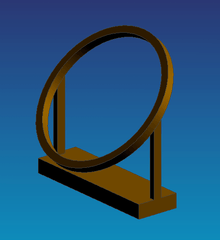
- The Chinese first produce paper.
- Silk Road between Europe and Asia.
- Hipparchus discovers precession of Earth's equinoxes and compiles first trigonometric tables.[3]
- According to legend, Liu An invents tofu.
- The Roman concrete (pozzolana) first used.
- A system for sending signs to communicate quickly over a long distance is described by Polybios. [4]
- The earliest known winnowing machine is depicted in a Han Dynasty Chinese tomb model.
Sovereign States
See: List of sovereign states in the 2nd century BC.
References
- Meister, Chad (2009). Introducing Philosophy of Religion. Abingdon: Routledge. p. 10. ISBN 0-203-88002-1.
- C.Michael Hogan, Silk Road, North China, The Megalithic Portal, ed. A. Burnham
- "Mathematics in the Context of Alexandrian Culture" (PDF).
- "Polybius • Histories — Book 10". penelope.uchicago.edu. Retrieved 2020-06-22. no-break space character in
|title=at position 28 (help)
